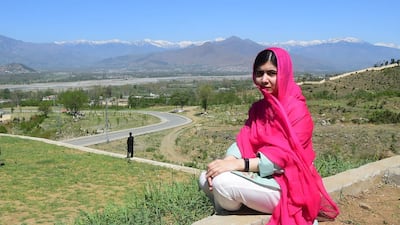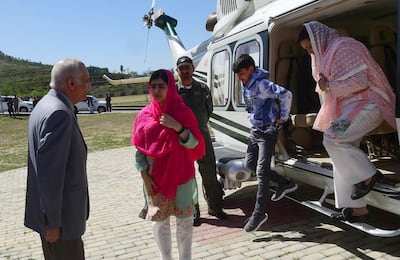Education activist Malala Yousafzai has returned to her hometown in Pakistan for the first time since she was shot in the head by the Taliban in 2012.
The 20-year-old, who is currently a student at Oxford University, was accompanied by the Pakistani military during her visit on Saturday to Swat Valley, which was once a militant stronghold.
Ms Yousafzai flew into the region by army helicopter from the capital Islamabad having arrived in Pakistan on Thursday.
Her visit was kept under wraps and many thought she would not return to Swat because of security concerns.
While in the region, Ms Yousafzai visited her childhood home with her mother, father and two brothers. She was welcomed by relatives, former classmates and friends who greeted her with flowers and hugs.
"It is still like a dream for me, am I among you? Is it a dream or reality," she said.
_______________
Read more:
Pakistan's courageous daughter is finally on home turf
Malala defies threats to return to Pakistan
_______________
The Nobel laureate later spoke with students at the all-boys Swat Cadet College Guli Bagh, which lies outside the district’s main town Mingora, before returning to Islamabad.
Mingora is where Ms Yousafzai’s family was living and where she was attending school on October 9, 2012, when a gunman boarded her school bus, asked "Who is Malala?", and shot her.
The Taliban said they had shot her because she had been "promoting Western culture in Pashtun areas".
She was treated first at an army hospital then airlifted to the British city of Birmingham.
Her near-miraculous recovery, and tireless career as an education advocate, have since turned her into a global symbol for human rights, and in 2014 she became the youngest person ever to be awarded the Nobel Peace Prize when she was just 17.
Ms Yousafzai’s unannounced visit has been met with widespread joy and pride.
She broke down in tears as she made a televised speech on Thursday, saying it was her "dream" to be back, and has vowed to Pakistani media that she will return permanently after she has completed her education.
However, she has also been met with pockets of intense criticism. Ms Yousafzai is widely respected internationally, but opinion is divided in Pakistan, where some conservatives view her as a Western agent on a mission to shame her country.
"What I want is for people to support my purpose of education and think about the daughters of Pakistan who need an education," she told Pakistan's The News in comments published on Saturday. "Don't think about me. I don't want any favour, or I don't want everyone to accept me. All I care about is that they accept education as an issue."
Swat, a mountainous region which was once a prized tourist destination famed for its pristine scenery, was overrun by the Pakistani Taliban in 2007.
The militants imposed a brutal, bloody rule, but the army drove them out in 2009 in an operation widely touted as a success story in Pakistan's long battle with extremism. Recently restrictions on tourists visiting the area were lifted.
However, security has remained fragile, as the assault on Ms Yousafzai three years after the military operation demonstrated. In February this year 11 military personnel were killed in an attack, and analysts have warned the militants still have a presence there.
Residents of the area have praised Ms Yousafzai in recent days, crediting her with helping to generate improvements in education- especially for girls- in the deeply conservative region, part of Khyber Pakhtunkhwa province.
Earlier this month an all-girls school built with money from the Malala Fund opened in Shangla district northeast of Mingora, where her family lived before moving to the city.


